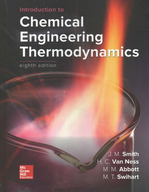?A pure-component pressure \(p_{i}\) for species i in a gas mixture may be defined as
Chapter 10, Problem 10.1(choose chapter or problem)
A pure-component pressure \(p_{i}\) for species i in a gas mixture may be defined as the pressure that species i would exert if it alone occupied the mixture volume. Thus,
\(p_{i} \equiv \frac{y_{i} Z_{i} R T}{V})
where \(y_{i}\) is the mole fraction of species i in the gas mixture, \(Z_{i}\) is evaluated at \(p_{i}\) and T, and V is the molar volume of the gas mixture. Note that pi as defined here is not a partial pressure \(y_{i} P\), except for an ideal gas. Dalton’s “law” of additive pressures states that the total pressure exerted by a gas mixture is equal to the sum of the purecomponent pressures of its constituent species: \(P = \Sigma_{i}p_{i}\) . Show that Dalton’s “law” implies that \(Z = \Sigma_{i}y_{i}Z_{i}\) , where \(Z_{i}\) is the compressibility factor of pure species i evaluated at the mixture temperature but at its pure-component pressure.
Text Transcription:
p_i
p_i equiv y_iZ_iRT/V
y_i
Z_i
y_iP
P = Sigma_ip_i
Z = Sigma_iy_iZ_i
Z_i
Unfortunately, we don't have that question answered yet. But you can get it answered in just 5 hours by Logging in or Becoming a subscriber.
Becoming a subscriber
Or look for another answer
